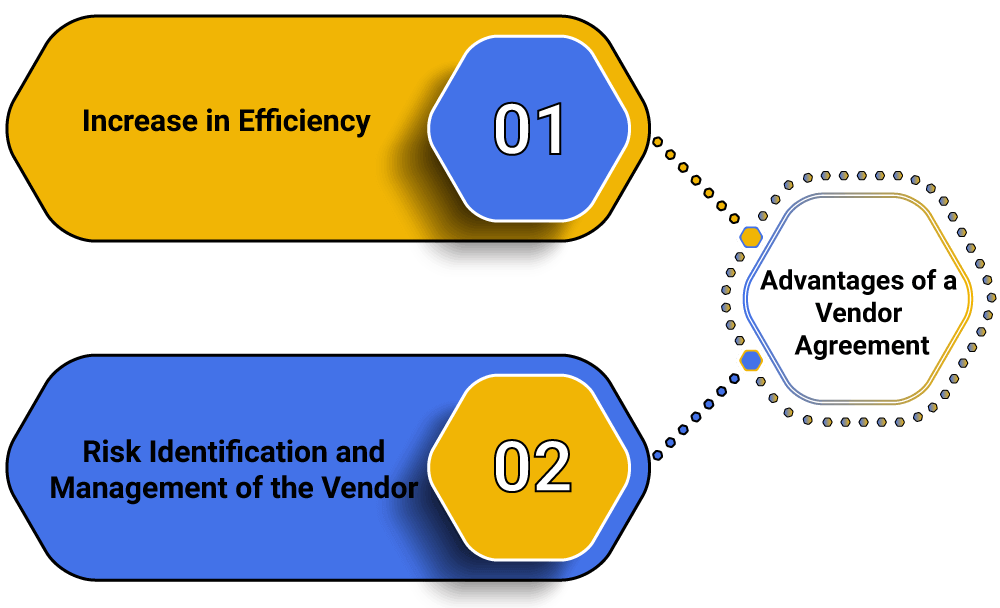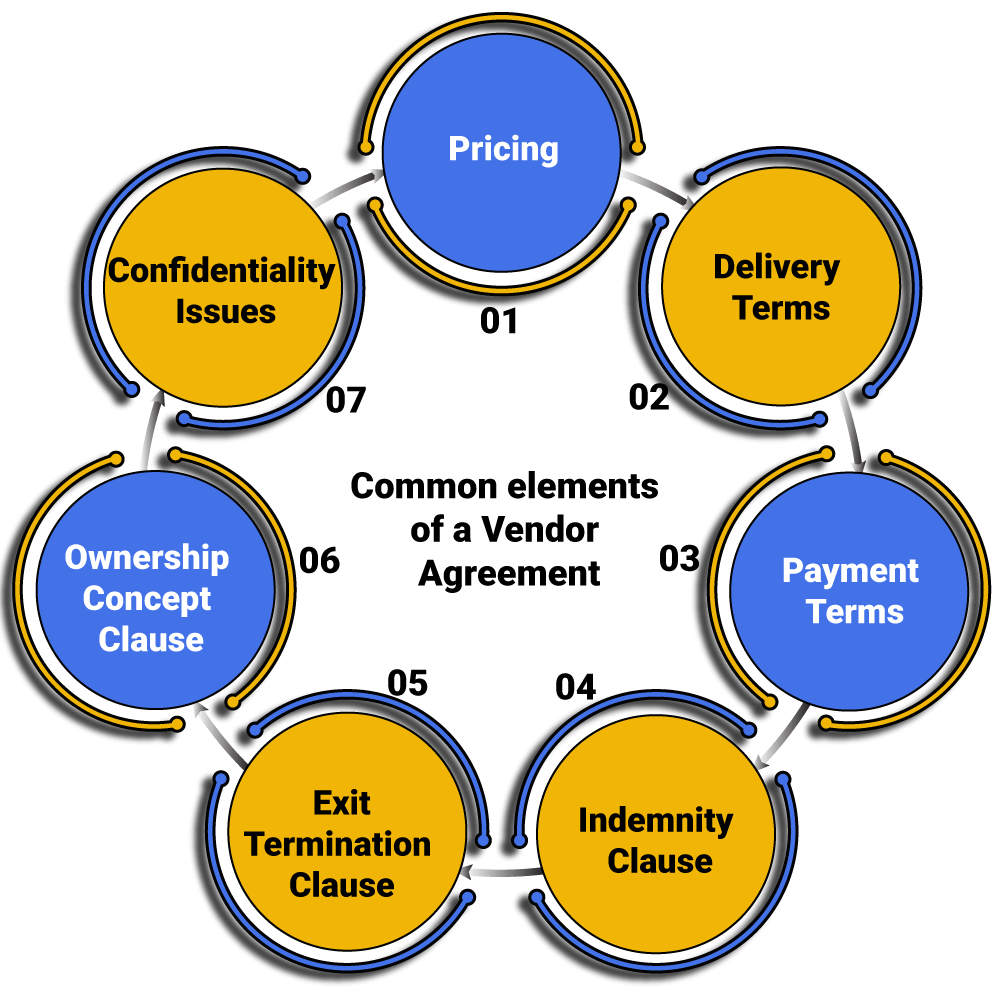What is a Vendor Agreement in India?
A Vendor Agreement in India is an agreement which defines the conditions and provisions of work that is to be performed by the vendor. The term vendor is typically used in describing the entity that has paid for the goods that are provided. The primary points included in this include the time, date, and location where the services should be provided.
If a personis a seller or in vendor business then there are many cases when he/she might require a document of Vendor Agreement in India. Such an agreement serves as a composed insurance between the two parties with their mutual consent. A personis required to have an agreement with his/her customers or his/her providers when he/she is into customer or supplier business transactions. A Vendor Agreement is usually made when the business of a person is small and he or she have couple of services or products for sale.
What is the Negotiation for a Vendor Agreement all about?
If in case the applicant is negotiating with any familiar business partner then it is eligible to be closed and finalized with a just a simple handshake but most likely a properly written agreement is the highest quality level Vendor Agreement. Since the guarantees, accounts, deposits and finances and much more are included in the Vendor Agreement. The simple way to get a Vendor Agreement finalized among the involved parties requires some preparation, a first-class introduction and clear discussion on the key highlights.
The opposite party can ask for some specific modifications as well as certain concessions. The applicant is required to evaluate and analyse the net impact of all such changes. It is absolutely fine to say that they are asking for too much money? Whether the demand is feasible? Very often some people take a disagreeing reaction or negotiations too personally, the applicant is required to get over it and depersonalize the same.
The applicant should take a look at the proposal in a very simple target way and also acknowledge it, re-submit it, or decline the same. Think about the subsequent step, and should be prepared to continue in a planned manner that the applicant cannot alter his/her position later on.
What are the advantages of a Vendor Agreement in India?

The advantages of a Vendor Agreement in India are as follows:
Increase in Efficiency
With a Vendor Agreement, a person can clearly determine the security policies, financials, and other important data that is to be required for the same which helps in increasing efficiency and also develops an effective supplier and vendor relationship.
Risk Identification and Management of the Vendor
Through a Vendor Agreement, there is a complete description of the duties, regulations, rules, and identification of the risk of vendor is properly defined.
What are the essential requirements of a Vendor Agreement in India?
The great structures of a vendor agreement portray the terms and conditions in a very clear and concise language. For the composition of an excellent Vendor Agreement document, the person applying is required to follow few steps to cover everything that will be required and is necessary for the same.
The steps that are required to be followed are as follows:
- To begin with, the applicant is required to show the dates in the first page of his or her Vendor Agreement and also demonstrate the address of the two parties involved in the Vendor Agreement document.
- Now in the next step, it is required to be demonstrated that the organization of the applicant is legitimately permitted to sell all the items and services engaged that are within the agreement. It is critical that the applicant clarify his or her vending license with in the Vendor Agreement.
- Next, the applicant is needed to diagram each of the expectations from the vendor before the composition of the real frame. It may include taxes, costs, delivery dates, paying modes, periods and compensation, etc.
- The applicant is required to demonstrate the way that he/she and his/her customer have consented for the management of the tax imposed on the products & services.
- Last but not the least it is required to specify the way to give the deliveries for the received order of the applicant, and how the order is going to be paid.
What are the principal features of a Vendor Agreement in India?
The principle key points of a Vendor Agreement in India are the services and products, cost, what will occur in future if something does not go as expected (some possibilities), and the date for the final delivery, etc. The vital aim of the Vendor Agreement is to be thorough; every condition must be incorporated into the Agreement very carefully. The applicant should always prefer not to get scorched nor do he/she wish a merchant to suffer amid this procedure.
Any organization which is reasonable for its vendors always gets a strong notoriety and everybody likes to make a deal with the owners that treat their suppliers decently. If in case, the applicant appropriately requests the citations for his/her prerequisites this procedure will guarantee him/her to never pay more than what exactly the current market permits.
What are the common elements of a Vendor Agreement in India?

Depending upon the different type of industry, the following elements are the central to the drafting of a Vendor Agreement in India:
- Pricing
This is one of the primary clauses that describes at which price the products will be given to the vendee. The price of products or services can be either variable or fixed. It can also change with the requirement of time and need.
- Delivery Terms
The vendor agreement should clearly stipulate the time and frequency terms of the contract between the parties.
- Payment Terms
The vendor agreement is required to also prescribe the penalties or interests charged for the delayed payments. The mode of payment should also be mentioned as well.
- Indemnity Clause
The problems concerning defective or damaged goods, delayed payments should be addressed more effectively.
- Exit/Termination Clause
A proper termination manner or an exit option unilaterally or bilaterally should also form the basis of any vendor agreement according to the requirement.
- Ownership Concept Clause
The whole concept of the work product ownership between the parties to the contract and it needs to be decided previously by way of including a clear clause for the same.
- Confidentiality Issues
The obligation to not disclose any kind of material information to the third party or non- stakeholders should find a proper mention in the vendor agreement.
What is the Procedure for a Vendor Agreement in India?
The procedure for a Vendor Agreement in India is as follows:
- A well competent lawyer from our team will contact you, and in detail will explain you the whole process, and will understand the need of a Vendor Agreement by you.
- Once the primary objectives of the same are clear, our lawyer will draft a sample of a Vendor Agreement accordingly.
- The drafted Vendor Agreement will be sent to you as soon as possible, for your review.
- The whole process will take around 3-4 working days.
Some Points to Remember
There is no requirement to agree to undersell the value of a product when a personis negotiating for a Vendor Agreement. The personis required to carefully examine the financial capability of the other party involved in the Agreement. If the personis rebating again and again and later on agreeing to them then it can reduce the credibility of his/her offerings.
Keep the mutual goals in your mind and negotiate in the best possible positive way. Also, avoid making any kind of unrealistic commitments.The ability to negotiate fairly will became the key principle for other success.
How will Swarit Advisors help you?
- Fill the Form
- Get a Call-back
- Submit Document
- Track Progress
- Get Deliverables
Frequently Asked Questions
The term “Vendor Agreement” means an agreement which clearly defines the conditions and provisions of work that is to be performed by the vendor.
The term vendor is typically used in describing the entity that has paid for the goods that are provided.
The vendor terms are common terms that is used throughout the industrial property market. This is a situation where the Vendor or the owner offers to the finance the sale of property rather than the purchaser going to the bank.
The term “Vendor Leasing” means a working relationship between a leasing company and a vendor of equipment to provide certain financing programs to the customers of the vendor to help stimulate the sales.
The term “Vendor Loan” means a financial term that describes the lending of the money by any vendor to a customer who uses that provided capital to purchase a specific product or services offerings of the vendor.
Yes, a Vendor Loan typically carries a higher interest rate than those associated with the traditional bank loans.
The Vendor acts as a supplier in a Vendor Agreement
The Elements of a Vendor Element are Pricing, Delivery Terms, Payment Terms, Indemnity Clause, Exit/ Termination Clause, Ownership Concept Clause, and Confidentiality Clause.
The term “Vendor Deposit” means a cheque of the company that is made out of the company’s account to the vendors before receiving the merchandises or services requested by the company. Further, it is a type of upfront payment and deserves very serious attention, appropriate control and record.
The benefits of a Vendor Agreement are Increase in Efficiency, Risk Identification, and Management of the Vendor.
The steps included in the procedure are, contact a well experienced lawyer, clear out the objectives, drafting of Vendor Agreement, and the Review of Vendor Agreement.


